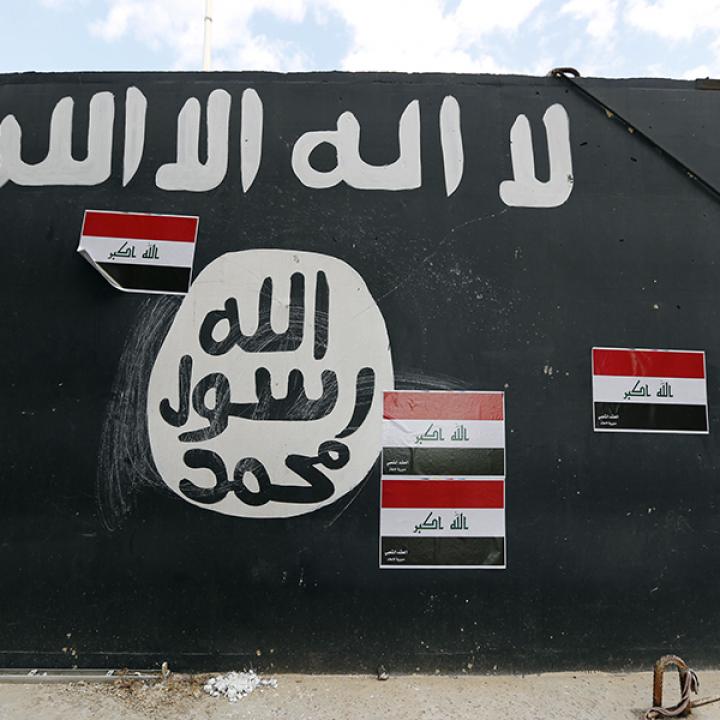

October 8, 2014
What is in a name? Apparently a lot. Branding is as important for terrorist groups as it is for companies, if not more so. A brand – its style, symbols, and words – can assist in detracting enemies, recruiting fighters and supporters, attracting followers, inspiring loyalty, raising funds, and conferring legitimacy. Put simply, words matter, particularly in the age of social media.
The group known as the Islamic State of Iraq and al-Sham (ISIS) has been building its brand effectively. It began as al-Qaeda in Iraq, then transformed itself into the Islamic State in Iraq, then moved on to ISIS, and, in its most recent iteration, it now calls itself the Islamic State (IS). The fact that ISIS has changed its name yet again shows that its leaders, including Abu Bakr al-Baghdadi, know the power of a brand.
For example, Osama bin Laden or one of his lieutenants wrote a letter in which changing the name of al-Qaeda was considered because the label "reduces the feeling of Muslims that we belong to them, and allows the enemies to claim deceptively that they are not at war with Islam and Muslims, but they are at war with the organization of al-Qaeda, which is an outside entity from the teachings of Islam." In other words, the organization’s name was not inclusive enough of its purported Islamic ideology, and the United States and its allies exploited this disconnect. Whether or not Bin Laden wrote it, it is clear that there was concern about al-Qaeda’s brand and its ability to attract recruits.
To counteract ISIS’s marketing efforts, prominent Muslims in the United Kingdom, a country from which at least 500 individuals have gone to fight in Syria, wrote a letter to Prime Minister David Cameron encouraging him to call ISIS the “Un-Islamic State (UIS).” They claim that the use of the name IS could radicalize people and that “(UIS) could be an accurate and fair alternative name to describe this group and its agenda.” They also discouraged the prime minister and the public from “legitimizing these ludicrous caliphate fantasies by accepting or propagating this name [the Islamic State].” Islamic religious authorities in Britain also issued a fatwa condemning the group, and Egypt’s top Islamic authority has suggested calling ISIS “al-Qaeda Separatists in Iraq and Syria,” the goal is to distinguish ISIS from the majority of peaceful Muslims and make clear that its claims to legitimacy are false.
Moreover, calling it IS confers a modicum of validity to the group’s aspiration to statehood. Despite President Obama’s speech in which he asserted that the group is “not Islamic [and]…certainly not a state,” if ISIS can demarcate borders, fight back invaders, and create governance structures, then it can become a state. Just because the international community does not recognize it now does not mean it will not be forced to do so in the future. Therefore, succumbing to the group’s own label grants it an unnecessary victory. While the term ISIS still contains the words “Islamic State,” the term is used to peg a terrorist group, and contains geographic limits on the territory under its control. IS, however, does not place limits on the group and, what is more, lends credence to al-Baghdadi’s claims to be the leader of Sunni Muslims the world over.
So this is where the Obama administration has it right. By calling it ISIS (or ISIL, an alternative acronym), the president affirms its status as a foreign terrorist organization (FTO). The FTO designation, applied to ISIS and its previous iterations since 2004, is important because it precludes any pressure to engage with ISIS diplomatically. Moreover, this label is consistent with American and allied military action as well as the broader strategy that President Obama outlined in early September. Strategic messaging and containing ISIS’s geographic reach in word – not only in deed – are important parts of limiting its appeal and reputation.
The United States faces an uphill challenge in its fight against ISIS. Government actors are not particularly skilled at confronting an ideological threat and face a number of constraints, while ISIS operates with relative impunity. As a dictatorial, brutal group, ISIS also does not, in the immediate future, have to answer to the public it controls. It is more flexible than the U.S. government and adept at using social media to strike fear into its enemies’ hearts and inspire loyalty. However, the United States has the outlets and individuals at its disposal to be extremely effective in shaping narratives and degrading the group, but only if they work in concert. Denial of what ISIS wants itself to be known as is not a denial of the threat it poses or an abdication to its heinous interpretation of Islam. Rather, it is a strategic move designed to deny ISIS something every marketer yearns for: a known and reputable brand.


